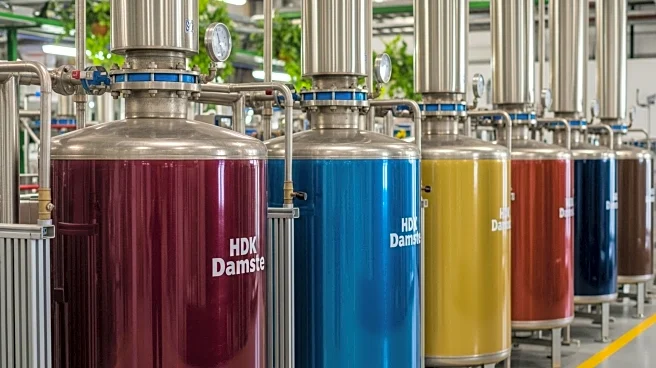What's Happening?
A comprehensive report by IMARC Group outlines the setup and economic prospects of a radiator coolant manufacturing plant, emphasizing industry trends and sustainability. The report provides detailed insights into the manufacturing process, financial metrics, and market dynamics for radiator coolants, which are essential for regulating engine temperatures in vehicles and machinery. It highlights the use of chemicals like ethylene glycol and propylene glycol, along with corrosion inhibitors, to ensure optimal engine performance. The report also discusses technological innovations such as organic acid technology and hybrid organic acid technology, which are reshaping the market landscape. The focus on biodegradable and non-toxic coolants is driven by regulatory compliance and environmental concerns, opening new opportunities in aftermarket distribution and industrial applications.
Why It's Important?
The radiator coolant market is rapidly evolving due to the expanding automotive industry and the rise of electric and hybrid vehicles, which require specialized cooling solutions. The emphasis on sustainability and regulatory compliance is pushing manufacturers to develop eco-friendly coolants, reducing environmental harm and meeting stringent emission standards. This shift not only supports market growth but also aligns with global trends towards more efficient and environmentally responsible automotive solutions. The report's insights into financial metrics and market trends provide valuable information for stakeholders looking to invest in or expand within this sector, highlighting the potential for profitability and innovation.
What's Next?
The report suggests that the radiator coolant market will continue to grow, driven by technological advancements and increased demand for sustainable solutions. Manufacturers are likely to focus on developing formulations that cater to the unique thermal management needs of electric and hybrid vehicles. As the industry adapts to these changes, there may be increased collaboration between automotive companies and coolant manufacturers to ensure compatibility and performance. Additionally, regulatory bodies may introduce stricter standards for coolant formulations, further encouraging innovation and compliance.
Beyond the Headlines
The shift towards biodegradable and non-toxic coolants reflects broader environmental and ethical considerations within the automotive industry. As consumers become more environmentally conscious, the demand for sustainable products is likely to increase, influencing market dynamics and product development. This trend may also lead to increased research and development efforts to create advanced formulations that balance performance with environmental impact, potentially setting new industry standards.











